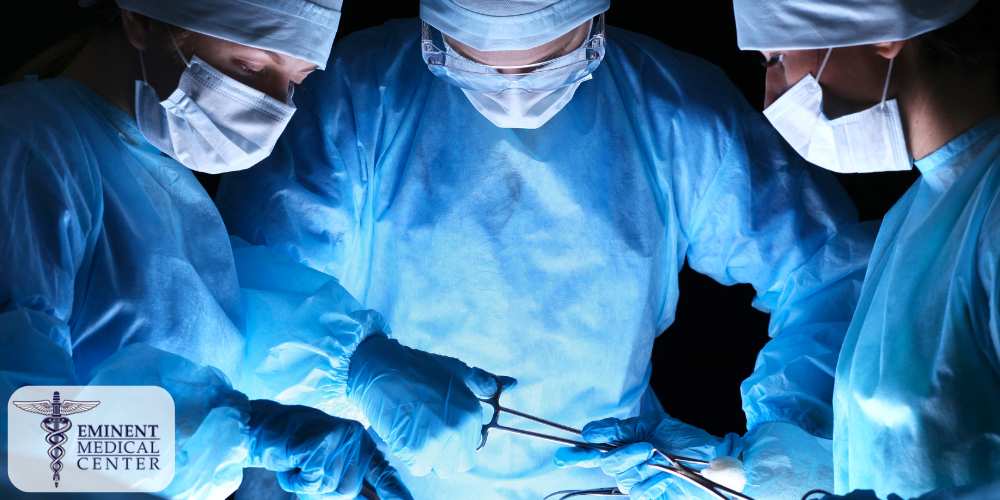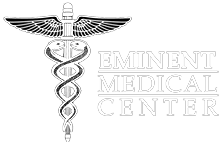Hand Surgery in Richardson, TX

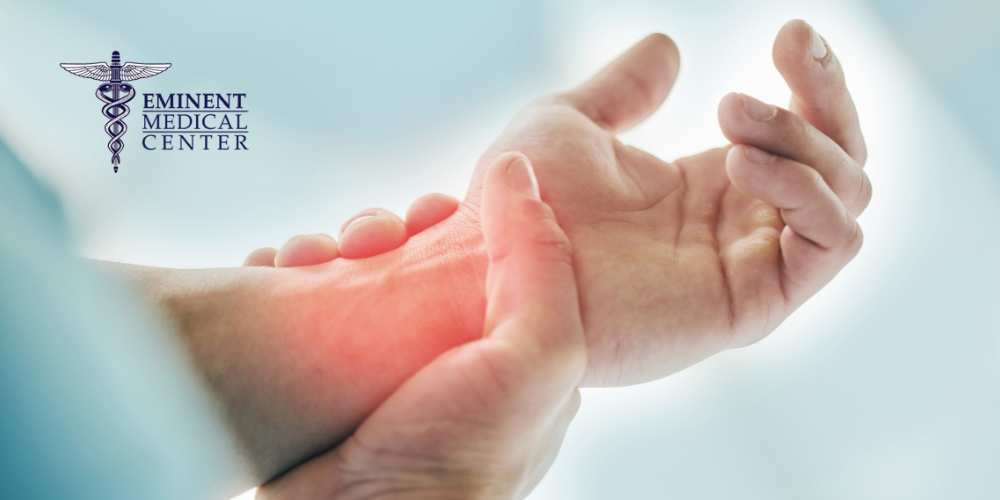
Hand surgery encompasses a wide range of procedures that fix or improve hand injuries, degenerative conditions, carpal tunnel syndrome, severe arthritis, and more. In Richardson, TX, Eminent Medical Center has emerged as a leading surgery center for several types of hand surgery. Our Richardson hand surgeons use state-of-the-art technology to completely restore our patients’ hand and finger function so that they can live pain-free and happy lives.
To learn more about hand surgery that our Richardson hand surgeons offer or to schedule an appointment at Eminent Medical Center, call 469-910-8800 today.
Common Reasons Why People Need Hand Surgery
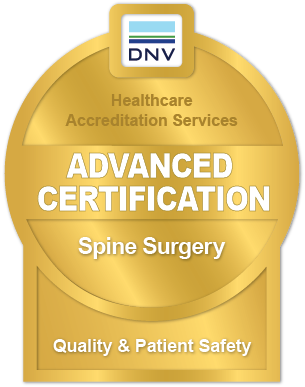
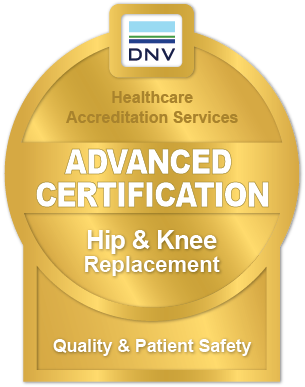
Patients may require surgery to relieve symptoms related to their hand condition, especially if nonsurgical treatment has been unsuccessful thus far. The most common surgeries repair nerves, flexor tendons, and joints.
Patients may seek relief from a Richardson, TX, hand surgeon for the following reasons:
Traumatic events such as fractures, dislocations, lacerations, tendon injuries, and nerve injuries often require surgical intervention to repair and restore function.
Arthritis-related problems, such as rheumatoid arthritis, can cause inflammation and pain in the hands, leading to deformities and dysfunction that may benefit from surgical correction.
Over time, wear and tear on the hand joints and structures can lead to osteoarthritis, necessitating surgery to alleviate uncomfortable symptoms and improve hand mobility.
Some people are born with a hand deformity such as syndactyly (fused fingers) or polydactyly (extra fingers), which can be corrected surgically to enhance hand function and appearance.
When infections in the hand or upper extremities are severe or do not respond to nonsurgical treatments, surgery may be needed to remove infected tissue and prevent further infection in the hand and upper extremity.
What Are the Most Common Types of Hand Surgery For Our Richardson Hand Surgeons
At Eminent Medical Center, our team of experienced surgeons can repair or improve all sorts of hand conditions and injuries. The most common types of hand surgery we offer are listed below.
Skin Grafts
A skin graft involves the transplantation of healthy skin from one area of the body to another and is commonly used to repair the hand after severe burns, trauma, or infections. This procedure helps to cover deep wounds and promote healing when the original or diseased tissue is not suitable for repair.
Skin Flaps
Similar to skin grafts, skin flaps include the transfer of healthy skin, skin flaps also incorporate underlying blood vessels, fat, and sometimes muscle for better blood flow. Skin flaps used when an area of the hand requires more blood flow and more complex reconstruction. Unlike a skin graft, though, a skin flap is still connected to the original donor site, and often requires delayed primary repair.
Closed Reduction and Fixation
This procedure is utilized to treat fractures in the hand. Closed reduction refers to the realignment of the broken bones without the need for an open incision. Fixation may involve the use of wires, splints, casts, or other means to keep the bones in place, allowing them to heal properly.
Joint Replacement
Joint replacement is also known as arthroplasty. Hand joint replacement or wrist joint replacement is typically performed to alleviate rheumatoid arthritis pain or repair joint damage. Richardson total joint surgery involves replacing the damaged hand or wrist joint with an artificial joint implant. Once the artificial joint implant is in place and healed, it can restore movement and reduce discomfort.
Joint Fusion
Joint fusion, also known as arthrodesis, is a surgical procedure performed to alleviate arthritic pain and stabilize the joints in the hand. The goal of joint fusion is to improve the quality of life for patients by providing a stable, pain-free joint that can support the demands of daily activities.
Replantation
Replantation refers to the reattachment of a finger, thumb, or hand after traumatic amputation. This complex surgery aims to restore as much function as possible and involves the reconnection of bones, tendons, blood vessels, nerves, and skin.
Nerve Repairs for Nerve Injuries
Some of our most common surgeries repair nerves. A damaged nerve in the hand is often caused by an injury. Nerve repairs in many cases can help restore movement for those who have lost hand and finger function. Nerve repairs are performed to reconnect the severed ends of the nerve or to remove a section of the damaged nerve and replace it with a nerve graft.
Fasciotomy
This procedure is often performed to treat compartment syndrome, where swelling within the hand’s enclosed spaces causes increased pressure and pain, potentially leading to muscle and nerve damage. Fasciotomy for compartment syndrome involves cutting open the fascia to relieve this pressure.
For compartment syndrome repair, your hand surgeon will make an incision in your hand or arm, this decreases pressure and restores blood flow. Any damaged body tissue will be removed. This helps prevent the loss of function of the affected hand.
Releasing the Median Nerve in Carpal Tunnel Syndrome Surgery
Carpal tunnel release surgery is a widely recognized treatment for carpal tunnel syndrome, relieving pressure on the median nerve, which passes through the carpal tunnel. Carpal tunnel syndrome develops when swelling compresses the median nerve. Carpal tunnel release surgery enlarges the tunnel and alleviates the pressure on the median nerve, offering patients relief from the discomfort and restoring the normal function of their hand.
Dupuytren's Contracture Surgery
Dupuytren’s contracture surgery is a procedure designed to relieve the flexion contracture (what makes the fingers curl) and restore function to the fingers affected by Dupuytren’s disease. Dupuytren’s contracture surgery typically involves the removal or release of these tightened cords of tissue.
Trigger Finger Release
Trigger finger release is performed when the fingers curl and become locked in a bent position, known as trigger finger. Our Dallas and Richardson, TX trigger finger surgery procedure involves releasing or widening the sheath that surrounds the tendon in the affected finger.
Surgical Drainage or Debridement
Surgical drainage or debridement may be necessary when an infection or wound is present. Surgical drainage involves removing pus, debris, or dead tissue to prevent further infection and allow the healthy body tissue to heal.
Tendon Repair
Tendons are the fibers that connect muscle to bone, and repairing these is crucial for the hand’s movement. Tendon injuries, such as tears, or inflammation of the tendon sheath may require surgery for tendon repair. Tendon repair for a damaged tendon is a delicate surgery that can range from a straightforward stitching together of a torn tendon to more complex procedures involving tendon grafts, especially if the damage is extensive.
Primary repair is for acute hand injuries. Primary repair often occurs within the first 24-48 hours after the injury.
Delayed primary repair. This tendon repair often happens a few days after a hand injury, but while there’s still an open wound.
Secondary repairs. This tendon repair may occur 2 weeks or longer after a hand injury. Secondary repairs typically include tendon grafts, which is when tendons from other body parts are inserted in the place of a damaged tendon. With some secondary repairs, more complex procedures may be required.
Patient Testimonials
Eminent Medical Center strives for the highest quality healthcare and is measured by the satisfaction of our patients overall experience.
EXCELLENTTrustindex verifies that the original source of the review is Google. I just had my second knee replacement surgery within 12 months (Dr. Berry is awesome!) and both were done at Eminent Center. The entire staff is friendly and caring from the time you walk in until the time you leave! Big kudos to the nursing staff. From surgery prep to the operating room to recovery they really have great attitudes. Thanks so much to my floor nurses. They are fantastic!!! Great experience overall!!!Posted onTrustindex verifies that the original source of the review is Google. I been here 4 times for my procedures. The best and friendliest staffs a patient can ever ask for!! Keep up the good work!! Thank you!Posted onTrustindex verifies that the original source of the review is Google. The team made sure they communicated with me very well. I knew everything I had to do every inch of detail, the facility was great, and the surgery went great. The instructions and follow up was outstanding.Posted onTrustindex verifies that the original source of the review is Google. EVERYONE was superb here- from the minute you walk in the door to the minute you leave! Attentive care for my recent surgery- made the process go smoothlyPosted onTrustindex verifies that the original source of the review is Google. The staff was amazing during my surgery! Friendly, professional, and caring through my entire experience. As an RN myself it was refreshing to have such a great experience with quality staff! Thank you to all the nurses and staff that cared for me! I highly recommend using this facility!Posted onTrustindex verifies that the original source of the review is Google. The place Is clean with a very friendyatavvyPosted onTrustindex verifies that the original source of the review is Google. The staff was great. My wait time was minimal. Very nice facility. I would recommend them to anyone needing day surgery such as I did. Thank you Eminent Medical.Posted onTrustindex verifies that the original source of the review is Google. Absolutely the best to ever do it! So, kind and the sense of urgency and willing to make you feel comfortable was amazing, good job to the team and my family and I are greatly appreciative!!!Posted onTrustindex verifies that the original source of the review is Google. My care was amazing. The food was descent and the doctors went above and beyond to make sure surgery was successful.Posted onTrustindex verifies that the original source of the review is Google. The whole experience wasn't stressful at all. The staff was amazing.. from checking in to prepping for the surgery they were friendly and helpful. Also, the building is very nice and they even have a little Bistro right there for those that are waiting. Thank you for making things so easy!
What to Expect Before, During, and After Hand Surgery at Eminent Medical Center
Even minor surgery is scary for most people, which is why it’s so important to receive full, informed consent before ever going under the knife. If you have scheduled your surgery at Eminent Medical Center, this is what you can expect before, during, and after your procedure.
Before Surgery
At Eminent Medical Center, patients will undergo a comprehensive evaluation, including medical history, physical examination, and possibly imaging studies to determine the best surgical plan. Preoperative instructions may include fasting, medication management, and preparation for recovery at home.
During Surgery
The team of highly skilled surgeons, anesthetists, and nurses at Eminent Medical Center utilize state-of-the-art operating rooms to ensure the highest standards of care. Depending on the type of surgery, various anesthesia methods may be used, from local anesthesia to general anesthesia, to ensure patient comfort.
After Surgery
Postoperative care is critical for a successful recovery. Eminent Medical Center provides personalized attention with private patient rooms for recovery, where our medical team closely monitors progress. Rehabilitation, including hand therapy, may begin soon after surgery to enhance the recovery of hand function.
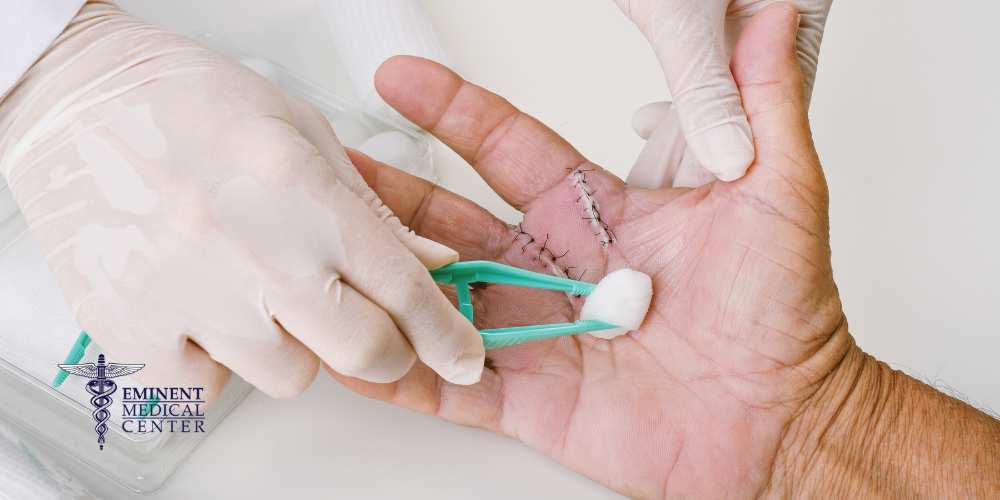
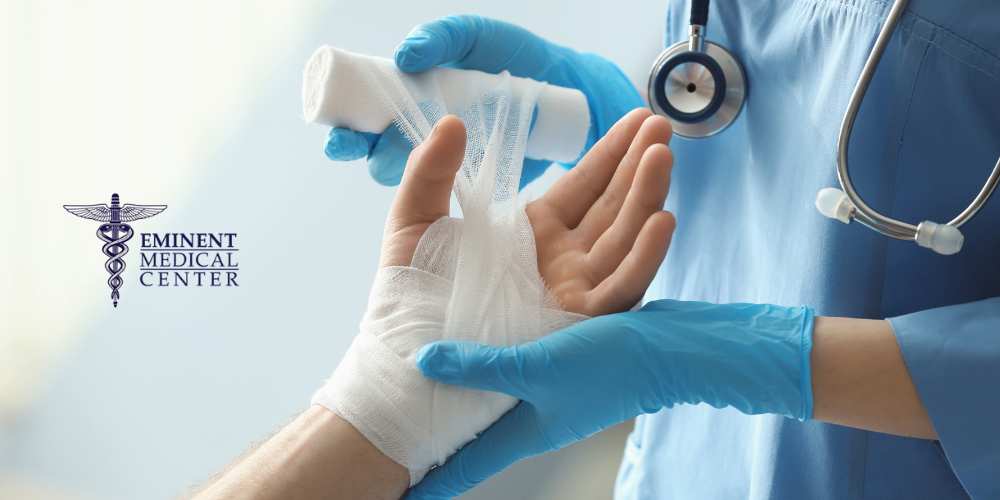
Hand Surgery Benefits
The benefits of hand surgery are extensive and can significantly improve a person’s quality of life. Surgery can restore function, reduce pain, and improve the cosmetic appearance of the hand. Improved hand function also enables patients to return to their daily activities and work.
Hand Surgery Risks and Complications
As with any surgery, there are potential risks and complications, such as infection, bleeding, or adverse reactions to anesthesia. Specific to hand surgery, there may be risks of stiffness, loss of motion, or nerve damage. Eminent Medical Center takes all necessary precautions to minimize these risks, ensuring a safe and successful surgical outcome.
